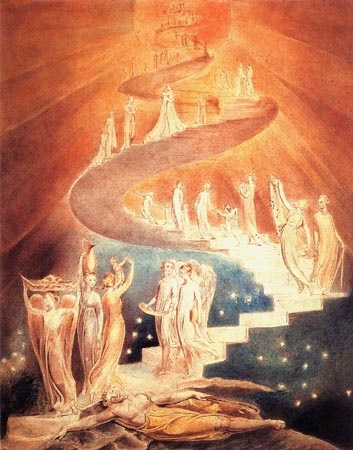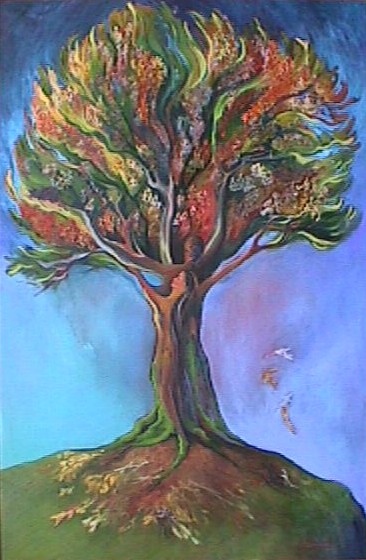Another Pathway is
Possible

No Human Being is an
Enemy of Another Human Being
The Holistic World Planetary Paradigm of The Spiritual UN
Caring About the Whole
Planet through
A Heart Centered Human Race for the Best in All
The Teilhard de Chardin Visionary Track for the Earth and Humanity
"Love is the affinity which links and
draws together the elements of the world... Love, in fact, is the agent
of universal synthesis."
Parting with War, Hate
and Fear of Others
—
“The line separating good & evil passes not through states, nor between
classes, nor between political parties either
– but right through every
human heart” :
Alexander Solzhenitsyn
Building a More Perfect Union
—
Where War is Not an
Option, But a Waste of All Life
—
Joining
the Eternal Vision
—
The
Peace and Brotherhood of
All
Plato’s “Ladder of Love”
–
The Ascent to Beauty Itself (Symposium)
The Evolution of
Human Perception:
From the Outer to the Inner and Then
From the Inner to the Outer World
|
|
|
|
"For It
is Virtue's Self
which Quickens Him" [the Human Spirit Toward Immortality]
Well then, she [the goddess Diotima] began,
the candidate for this initiation cannot, if his efforts are to be
rewarded, begin too early to devote himself to the beauties of the body.
First of all, if his preceptor instructs him as he should, he will fall
in love with the beauty of one individual body, so that his passion may
give life to noble discourse. Next he must consider how nearly related
the beauty of any one body is to the beauty of any other, when he will
see that if he is to devote himself to loveliness of form it will be
absurd to deny that the beauty of each and every body is the same.
Having reached this point, he must set himself to be the lover of every
lovely body, and bring his passion for the one into due proportion by
deeming it of little or of no importance.
Next he must grasp that the beauties of the body are as
nothing to the beauties of the soul, so that wherever he meets with
spiritual loveliness, even in the husk of an unlovely body, he will find
it beautiful enough to fall in love with and to cherish--and beautiful
enough to quicken in his heart a longing for such discourse as tends
toward the building of a noble nature. And from this he will be led to
contemplate the beauty of laws and institutions. And when he discovers
how nearly every kind of beauty is akin to every other he will conclude
that the beauty of the body is not, after all, of so great moment.
And next, his attention should be diverted from institutions
to the sciences, so that he may know the beauty of every kind of
knowledge. And thus, by scanning beauty's wide horizon, he will be saved
from a slavish and illiberal devotion to the individual loveliness of a
single boy, a single man, or a single institution. And, turning his eyes
toward the open sea of beauty, he will find in such contemplation the
seed of the most fruitful discourse and the loftiest thought, and reap a
golden harvest of philosophy, until, confirmed and strengthened, he will
come upon one single form of knowledge, the knowledge of the beauty I am
about to speak of.
And here, she said, you must follow me as closely as you
can.
Whoever has been initiated so far in the mysteries of Love
and has viewed all these aspects of the beautiful in due succession, is
at last drawing near the final revelation. And now, Socrates, there
bursts upon him that wondrous vision which is the very soul of the
beauty he has toiled so long for. It is an everlasting loveliness which
neither comes nor goes, which neither flowers
nor fades, for such beauty is the same on every hand, the same then as
now, here as there, this way as that way, the same to every worshiper as
it is to every other.
Nor will his vision of the beautiful take the form of a
face, or of hands, or of anything that is of the flesh. It will be
neither words, nor knowledge, nor a something that exists in something
else, such as a living creature, or the earth, or the heavens, or
anything that is--but subsisting of itself and by itself in an eternal
oneness, while every lovely thing partakes of it in such sort that,
however much the parts may wax and wane, it will be neither more nor
less, but still the same inviolable whole.
And so, when his prescribed devotion to boyish beauties has
carried our candidate so far that the universal beauty dawns upon his
inward sight, he is almost within reach of the final revelation. And
this is the way, the only way, he must
approach, or be led toward, the sanctuary of Love. Starting from
individual beauties, the quest for the universal beauty must find him
ever mounting the heavenly ladder, stepping from rung to rung--that is,
from one to two, and from two to every lovely body, from bodily beauty
to the beauty of institutions, from institutions to learning, and from
learning in general to the special lore that pertains to nothing but the
beautiful itself--until at last he comes to know what beauty is.
And if, my dear Socrates, Diotima went on, man's life is
ever worth the living, it is when he has attained this vision of the
very soul of beauty. And once you have seen it, you will never be
seduced again by the charm of gold, of dress, of comely boys, or lads
just ripening to manhood; you will care nothing for the beauties that
used to take your breath away and kindle such a longing in you, and many
others like you, Socrates, to be always at the side of the beloved and
feasting your eyes upon him, so that you would be content, if it were
possible, to deny yourself the grosser necessities of meat and drink, so
long as you were with him.
But if it were given to man to gaze on beauty's very
self—unsullied, unalloyed, and freed from the mortal taint that haunts
the frailer loveliness of flesh and blood—if, I say, it were given to
man to see the heavenly beauty face to face, would you call his, she
asked me, an unenviable life, whose eyes had been opened to the vision,
and who had gazed upon it in true contemplation until it had become his
own forever?
And remember, she said, that it is when he looks upon
beauty's visible presentment, and only then, that a man will be
quickened with the true, and not the seeming, virtue—for it is virtue's
self that quickens him, not virtue's semblance. And when he has brought
forth and reared this perfect virtue, he shall be called the friend of
God, and if ever it is given to man to put on immortality, it shall be
given to him (Symposium 210a-212b).
|
~~~***~~~ |
|
Food for Thought
—
The Original Americans on Virtue |
“No
people will tamely surrender their Liberties, nor can any be easily
subdued, when knowledge is diffused and Virtue is preserved. On the
Contrary, when People are universally ignorant, and debauched in their
Manners, they will sink under their own weight without the Aid of
foreign Invaders”
—
Samuel Adams
The life of the
nation is secure only while the nation is honest, truthful, and
virtuous"
—
Frederick Douglass
- [Frederick Baily] (1818- 1895), Escaped slave,
abolitionist, author, editor of the North Star and later the New
National Era
|
|



